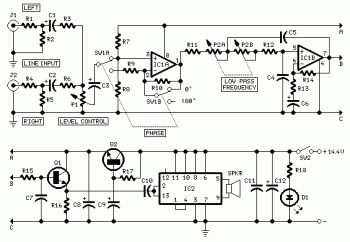Components Part:
| R1,R4 = 1K R2,R3,R5,R6 = 10K R7,R8 = 100K R9,R10,R13 = 47K R11,R12 = 15K R14,R15,R17 = 47K R16 = 6K8 R18 = 1K5 P1 = 10K Log Pot P2 = 22K Dual gang Linear Pot D1 = LED Q1,Q2 = BC547 | C1,C2,C3,C6 = 4µ7/25V C4,C5 = 68nF C7 = 33nF C8,C9 = 220µF/25V C10 = 470nF C11 = 100nF C12 = 2200µF/25V IC1 = TL072 IC2 = TDA1516BQ SW1 = DPDT Switch SW2 = SPST Switch (current handling min 3A) SPKR = 4 Ohm Woofer or paralled two 8 Ohm Woofers |
Circuit Notes:
- The circuit connected to the output of existing amplifier. Take note that this circuit is not an amplifier, it just similar to crossover circuit.
- Use heatsink to IC2 to keep the IC from overheating.
Page source of Subwoofer Driver Circuit for Stereo Car Audio System: redcircuits
About Audio Amplifier
An audio amplifier is an electronic amplifier that amplifies low-power audio signals (signals composed primarily of frequencies between 20 - 20 000 Hz, the human range of hearing) to a level suitable for driving loudspeakers and is the final stage in a typical audio playback chain.
The preceding stages in such a chain are low power audio amplifiers which perform tasks like pre-amplification, equalization, tone control, mixing/effects, or audio sources like record players, CD players, and cassette players. Most audio amplifiers require these low-level inputs to adhere to line levels.
While the input signal to an audio amplifier may measure only a few hundred microwatts, its output may be tens, hundreds, or thousands of watts. More explanation about power audio amplifier can be found at wikipedia.org
An audio amplifier is an electronic amplifier that amplifies low-power audio signals (signals composed primarily of frequencies between 20 - 20 000 Hz, the human range of hearing) to a level suitable for driving loudspeakers and is the final stage in a typical audio playback chain.
The preceding stages in such a chain are low power audio amplifiers which perform tasks like pre-amplification, equalization, tone control, mixing/effects, or audio sources like record players, CD players, and cassette players. Most audio amplifiers require these low-level inputs to adhere to line levels.
While the input signal to an audio amplifier may measure only a few hundred microwatts, its output may be tens, hundreds, or thousands of watts. More explanation about power audio amplifier can be found at wikipedia.org
This is a video tutorial about how to a very simple audio amplifier based on the LM386 amplifier chip. It can be built for less than $20 (or might be less than $8 in some countries) and used to amplify any low level audio signal including a guitar, bass or mp3 player.
Watch the video:

No comments:
Post a Comment